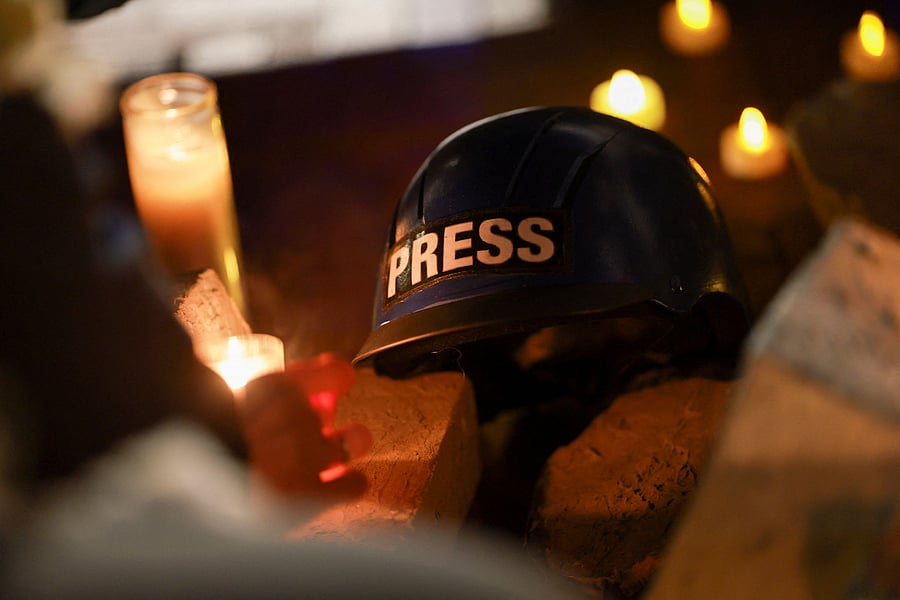
The study warns that outdated colonial-era laws and digital clampdowns are being weaponised to silence critical voices.
Credits: Reuters Photo
A recent study found that 213 journalists have been killed in 19 Commonwealth countries between 2006 and 2023, and in 96% of these cases, the perpetrators have not been brought to justice.
The finding comes from a report, published on September 9, that paints a grim picture of free expression across the Commonwealth, warning that outdated colonial-era laws and digital clampdowns are being weaponised to silence critical voices.
The study, titled Who Controls the Narrative? Legal Restrictions on Freedom of Expression in the Commonwealth, was jointly published in 2025 by the Commonwealth Human Rights Initiative (CHRI), the Commonwealth Journalists Association (CJA), and the Commonwealth Lawyers Association (CLA).
India among worst hit
India accounts for 56 of the 213 killings, the second-highest number recorded among the Commonwealth countries. Pakistan ranks first in the number of journalists killed in the given period. As many as 87 journalists were killed in Pakistan. Bangladesh (20), Nigeria (13) and Sri Lanka (9) also feature in the list.
The report notes that India is also the “world’s internet shutdown leader” with at least 116 shutdowns in 2024, disrupting access to information during elections and times of unrest.
It warns that Indian authorities continue to rely on sedition and defamation laws to target critics, despite moves to repeal or reform some of these provisions. “Though the development of the internet and social media requires legislation to ensure the protection of privacy and to guard against misinformation, many laws framed to deal with these issues have put additional and often loosely defined powers in the hands of the government, which seriously restrict the freedom of expression,” a senior Indian journalist is quoted in the report as saying.
Colonial laws linger on
Across the Commonwealth, restrictive laws remain deeply entrenched. The report finds that 41 countries still criminalise defamation, 48 retain sedition laws, and 37 maintain blasphemy or blasphemy-like provisions.
An example pointed out in the study is that in Pakistan, blasphemy accusations have led to mob violence, extrajudicial killings, and lengthy prison sentences for journalists and activists. Dozens remain on death row for blasphemy convictions. In Nigeria and Bangladesh, too, accusations of blasphemy have led to deaths and prolonged imprisonment.
“These laws with their potential for severe sanctions create a chilling effect on freedom of expression,” the report observes, adding that they are routinely misused against “journalists, media workers, human rights defenders, activists, and political opponents.”
Even in countries that have repealed criminal defamation, civil defamation lawsuits are often filed as SLAPPs (Strategic Lawsuits Against Public Participation) to silence media houses and civil society groups.
Weaponising the law
The report cites a global study which found that nearly 48% of journalists surveyed across 106 countries reported facing legal threats directed at themselves or their outlets. “Allowed to spread unchecked, the weaponisation of the law will continue to curtail media freedom by hampering coverage of critical public interest matters, undermining accountability, and eroding trust in journalism, with catastrophic effects on democracies and freedoms globally,” says the report.
In Uganda, the government has invoked anti-terrorism laws to shut down independent media outlets and arrest journalists critical of state policies. In Cameroon, Rwanda, Seychelles, and Dominica, sedition provisions have been used to muzzle political opposition.
Women journalists face particular risks. A survey cited in the study found that 73% of women journalists across 15 countries experienced online violence, often in the form of rape threats and sexual harassment.
Impunity and accountability gap
The study warns that the Commonwealth’s credibility is under threat as member states fail to demonstrate accountability for journalist killings. It points out that Bangladesh, Barbados, Cameroon, and Sri Lanka did not respond to UNESCO’s 2024 request for information on cases involving murdered journalists, while countries including India acknowledged the request but failed to provide substantive information.
A call for urgent reform
The report has been released just months after Commonwealth leaders adopted the Commonwealth Principles on Freedom of Expression and the Role of the Media in Good Governance (the Media Principles) at their 2024 summit in Samoa. These principles call on member states to repeal restrictive laws, protect journalists, and end impunity for attacks.
But adoption is only the first step, the study cautions. “Amid escalating attacks on free speech and the erosion of civic space, there is an urgent imperative for the Commonwealth member states to act decisively,” it states.
The report recommends that governments repeal sedition, blasphemy, and criminal defamation laws; strengthen judicial independence and anti-SLAPP protections; stop arbitrary internet shutdowns; and promote media pluralism.
“Two-and-a-half billion people, almost a third of the world’s population, live in countries that were formerly colonised, mainly by the British Empire… But the remnants of colonial law and oppressive legal cultures remain, and many of them penalise journalists,” human rights lawyer Karuna Nundy, quoted in the report, warns. “The Commonwealth cannot, like erstwhile colonial powers, stand silent and allow the persecution of journalists while democracy withers," says Karuna.